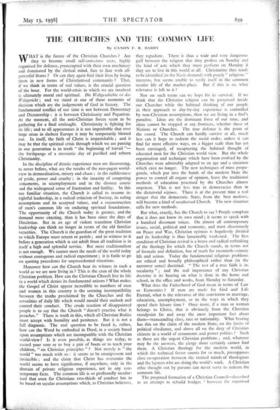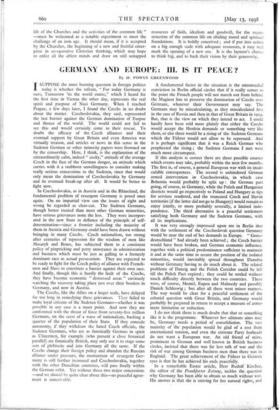THE CHURCHES AND THE COMMON LIFE
By CANON F. R. BARRY
WHAT is the future of the Christian Churches ? Are they to become small self-conscious sects, highly organised for defence, preoccupied with their own machinery and dominated by the clerical mind, face to face with all- powerful States ? Or can they again find their lives by losing them in new forms of Christianised community ? That, if we think in terms of real values, is the crucial question of the hour. For the world-crisis in which we are involved is ultimately moral and spiritual. Die Weltgeschichte ist das Ireltgericht ; and we stand at one of those moments of decision which are the judgements of God in history. The fundamental conflict of our time is not between Democracy and Dictatorship : it is between Christianity and Paganism. At the moment, all the anti-Christian forces seem to be gathering for a final onslaught. Christianity is fighting for its life; and to all appearances it is not improbable that over large areas in darkest Europe it may be temporarily blotted out. In itself, the faith of Christ is imperishable ; and it may be that the spiritual crisis through which we are passing in our generation is in truth " the beginning of travail "- the birthpangs of a messianic day of purified and reborn Christianity.
In the discipline of drastic experience men are discovering, as never before, what are the results of the neo-pagan world- view in demoralisation, misery and chaos ; in the ruthlessness of pride, power and cruelty ; in the insanity of competing armaments, in unemployment and in the divorce courts and the widespread sense of frustration and futility. In this too familiar situation, the Church is called to resume its rightful leadership, in a radical criticism of Society, its ruling assumptions and its accepted values, and a reconstruction of men's common life on enduring spiritual foundations. The opportunity of the Church today is greater, and the demand more exacting, than it has been since the days of Diocletian. But in an age of violent transition Christian leadership can think no longer in terms of the old familiar securities. The Church is the guardian of the great tradition to which Europe must return or perish ; and to witness to it before a generation which is cut adrift from all tradition is in itself a high and splendid service. But mere traditionalism is not enough. We cannot meet the needs of the world today without courageous and radical experiment ; it is futile to go on quoting precedents for unprecedented situations.
Moreover how can the Church bear its witness in such a world as we are now living in ? This is the crux of the whole Christian problem. How can the Christian Church live its life in a world which denies its fundamental axioms ? What makes the Gospel of Christ appear incredible to numbers of men and women in this country is the seeming incompatibility between the truths proclaimed by the Churches and the actualities of daily life which would mould their outlook and control their conduct. The crude reaction of disappointed people is to say that the Church "doesn't practise what it preaches." There is truth in this, which all Christian Bodies must accept with humility and penitence. But it is not a full diagnosis. The real question to be faced is, rather, how can the Word be embodied in Deed, in a society based upon assumptions which are incompatible with the Christian world-view? Is it even possible, as things are today, to record your vote or to buy a pair of boots or to teach your children, " on Christian principles " ? Not merely is " the world " too much with us : it seems to be omnipresent and invincible ; and the claim that Christ has overcome the world seems to have significance, if anywhere, only in the domain of private religious experience, not in any con- temporary facts. The common life is so profoundly secular- ised that even for Christians two-thirds of conduct has to be based on secular assumptions which, as Christian believers, they repudiate. There is thus a wide and very dangerous gulf between the religion that they profess on Sunday and the kind of acts which they must perform on Monday if they are to live in this world at all. Christianity thus tends to be identified (as the Nazis demand) with purely religious " interests, but seems unable to verify itself in the common secular life of the market-place. But if this is so, what relevance is left to it ?
Nor on such terms can we hope for its survival. If we think that the Christian religion can be preserved inside our Churches while the habitual thinking of our people in their approach to day-by-day experience is controlled by non-Christian assumptions, then we are living in a fool's paradise. Ideas are the dominant force of our time, and ideas cannot be stopped at any frontiers, whether those of Nations or Churches. The true defence is the point of the sword. The Church can hardly survive at all, much less can it hope to redeem the social order, unless it can find far more effective ways, on a bigger scale than has yet been envisaged, of recapturing the habitual thought of educated men for the Christian world view. But the whole organisation and technique which have been evolved by the Churches were admirably adapted to an age and a situation which exist no longer. The new techniques of mass propa- ganda, which put into the hands of the modern State the power to control all organs of opinion, leave the traditional methods of education practised by the Churches almost impotent. This is not less true in democracies than in the dictatorial regimes. There is at the present time a real danger that the democratic State, from the best motives, will become a kind of secularised Church. The new situation calls for new methods.
But what, exactly, has the Church to say ? People complain that it does not know its own mind ; it seems to speak with a hundred dissonant voices. On almost all contemporary issues, social, political and economic, and most disastrously on Peace and War, Christian opinion is hopelessly divided and its leadership is thus lamentably weakened. The first condition of Christian revival is a brave and radical rethinking of the theology for which the Church stands, in terms not of formula and definition, but of truth for twentieth-century life and action. Today the fundamental religious problems are ethical and broadly philosophical rather than (in the narrower sense) doctrinal. " The test of a true faith is its secularity " ; and the real importance of any Christian doctrine is its bearing on what is done in the home and school, in the office and works, from Monday to Saturday.
What does the Fatherhood of God mean in terms of Law or Economics ? If men are made for God and Life Eternal, what is the relevance of this conviction to marriage, education, unemployment, or to the ways in which they spend their leisure time ? Once more, if a man or woman belongs to Christ, that is obviously from the Christian standpoint far and away the most important fact about them—transcending class, race or nationality. What bearing has this on the claim of the modern State, on the limits of political obedience, and above all on the duty of Christian citizens in a world of armaments and power politics ? Such as these are the urgent Christian problems ; and, whatever may be the answers, the clergy alone certainly cannot find them. A Christian theology for the modern world, in which the technical factor counts for so much, presupposes close co-operation between the trained minds of theologians and the laymen who are doing the world's work. A Christian ethic thought out by parsons can never serve to redeem the common life.
The proposed formation of a Christian Council—described as an attempt to rebuild bridges " between the organised life of the Churches and the activities of the common life " —must be welcomed as a notable experiment to meet the challenge of an iron age. It should mean, if it is accepted by the Churches, the beginning of a new and fruitful enter- prise in co-operative Christian thinking, which may hope to enlist all the ablest minds and draw on still untapped resources of faith, idealism and goodwill, for the recon- struction of the common life on abiding moral and spiritual foundations. It is boldly conceived ; and if put into action on a big enough scale with adequate resources, it may well mark the opening of a new era. It is the laymen's chance to think big, and to back their vision by their generosity.















































 Previous page
Previous page